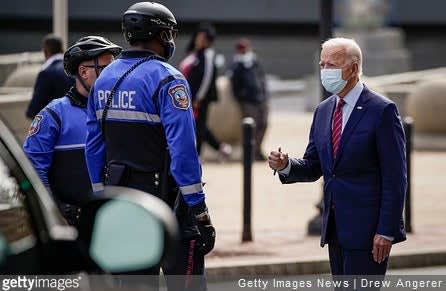Joe Biden and Kamala Harris were unambiguous throughout their presidential campaign: they believe that racism pervades policing and all other aspects of the criminal-justice system. Just a day before the networks declared Biden the president-elect, he claimed a “mandate” to eliminate “systemic racism.” During the campaign, Biden routinely announced that black parents were right to worry that their children would be shot by the police, an assertion formalized in his campaign plan for “strengthening . . . justice.”
The Biden Threat to Law Enforcement
Police departments are now on notice: they may expect a knock on the door at any time from a Washington attorney, demanding truckloads of documents as the prelude to years of federal interference and budget-busting compliance rules and fees

Biden’s plan for “strengthening America’s commitment to justice” reads like a Black Lives Matter wish list; there is no reason to think that a Biden–Harris Justice Department will not implement it. Among its most consequential proposals, it calls for a return to the practice of imposing weakly-justified consent decrees on police departments.
President Trump’s first attorney general, Jeff Sessions, reformed that practice, requiring that a high-level DOJ official approve each consent decree, that those decrees have a sunset date—usually no longer than three years—and that they specify what a department must do to terminate the decree.
This sensible set of guidelines will now be torn up, if Biden’s narrow victory holds. Biden’s criminal-justice plan promises to “reverse” the Trump “limitations” and to “prioritize” the use of consent decrees. Police departments are now on notice: they may expect a knock on the door at any time from a Washington attorney, demanding truckloads of documents as the prelude to years of federal interference and budget-busting compliance rules and fees. Strikingly, the justice blueprint goes further than even Obama-era policy by calling for pattern-or-practice investigations of prosecutors’ offices, on the ground that they, too, engage in “systemic misconduct.”
Read complete article at City Journal.
More Blog Posts
Preventing Heat Injury in Police K-9s
In the relentless heat of summer and even early fall in some parts of the country, officers face the important task of protecting their K-9 partners while working in sweltering temperatures. Recognizing changes in a dog’s behavior is the key.
Read More →Why Your Agency Needs to Attend the ILEETA Conference
ILEETA is a complete resource for trainers to address trainers' needs. Its mission is to enhance the skills and safety of criminal justice practitioners while fostering stronger and safer communities.
Read More →IACP 2023: New Training Products
Technologies for improving law enforcement training and training management were some of the highlights at this year's show.
Read More →Initial Results Released from MSP 2024 Police Vehicle Testing
The 2024 pursuit-rated vehicles--all pickup trucks or SUVs, including two battery electric models the Chevrolet Blazer EV AWD and Ford Mustang Mach-E--were put through their paces.
Read More →Officer Safety Considerations Related to Alternative-Fuel Vehicles
As more alternative-fuel and hybrid vehicles hit the road, police and other first responders need to understand that they are no more dangerous than conventional vehicles. However, there are certain safety considerations every cop should know.
Read More →Garmont Working to Grow LE Market Presence
Garmont Tactical has found wide acceptance by military boot buyers, but now the company is trying to better respond to the needs of police officers. Many cops now are not fans of 8-inch boots, so Garmont is adapting.
Read More →Publisher’s Note: Our Commitment to You
Through our magazine and website and our Police Technology eXchange event, we promise to provide you with information and access to resources to help you do your job safer and better.
Read More →10 Tips for Responding to Mental Health Crisis Calls
The Harris County Sheriff's Office is a model for other agencies that want to learn about crisis intervention and mental health crisis response. Sgt. Jose Gomez shares the story of their programs and provides 10 tips for mental health crisis call response
Read More →5 Things to Know When Buying Concealed-Carry or Off-Duty Holsters
Mike Barham, of Galco Holsters, shares five important considerations to keep in mind when you buy off-duty concealed or plain-clothes carry holsters.
Read More →10 Tips for Reviewing Use-of-Force Reports
While the burden of accurately reporting use-of-force situations is on an individual deputy or officer, the person reviewing those reports shares in the responsibility of making sure the reporting is done properly, with clear details included.
Read More →










